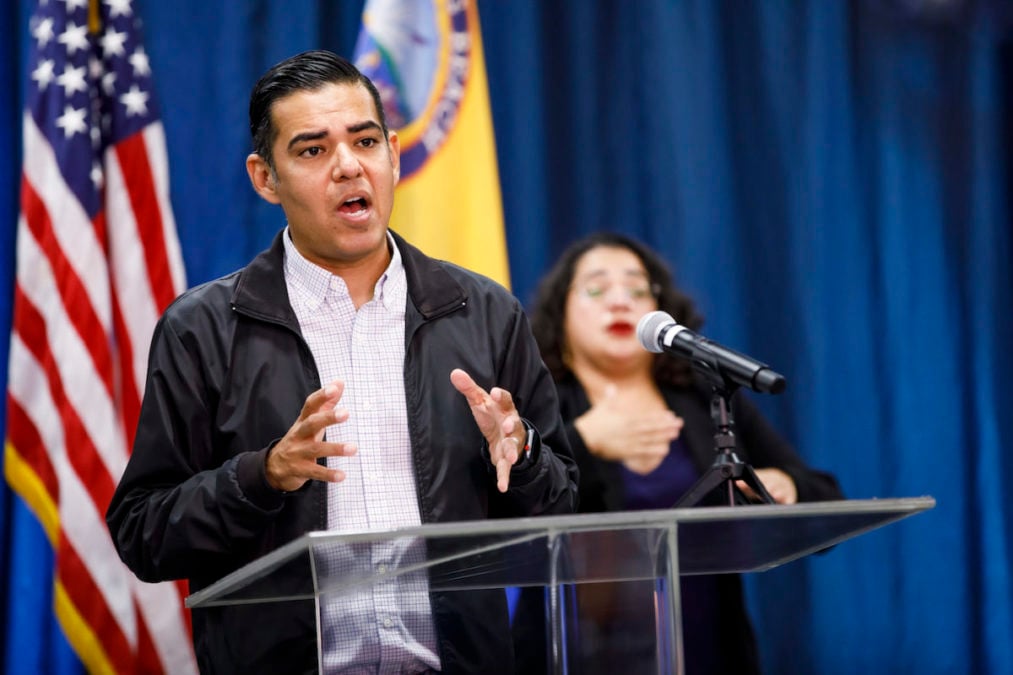
Robert Garcia, the mayor of Long Beach, speaks at a virtual press conference about COVID-19 on July 2 at the city’s Emergency Operations Center. Photo: City of Long Beach.
Editorial
LONG BEACH — Four months into the COVID-19 public health emergency, and nobody knows the virus’ impact on the health of LGBTQ people in Long Beach.
The answer is unknown because the data isn’t being collected. Pennsylvania, however, became the first state in the union to collect sexual orientation and gender identity data. They started in May. Also, a bill is making its way through Sacramento that would require LGBTQ data related to COVID-19 be collected throughout the state.
It’s vital to have this information because the LGBTQ community is vulnerable to COVID-19.
LGBTQ community vulnerable to COVID-19
- The LGBTQ community has underlying health conditions (chronic lung disease, cardiovascular disease, diabetes, and HIV)
- The LGBTQ community experience various health disparities, such as discrimination in health care.
Four months after Q Voice News started asking why sexual orientation and gender identity data wasn’t being collected at COVID-19 testing sites, the City of Long Beach is finally doing something.
Long Beach lags
This week, the city’s COVID-19 appointment forms and testing sites will collect data on sexual orientation and gender identity. City officials said the change in procedure was not influenced by Q Voice News’ reporting on the issue and frequent questioning of health officials and the mayor at virtual press conferences.
More than 60 percent of COVID-19 testing takes place at city sites.
Kelly Colopy, the director of the Long Beach Department of Health and Human Services, said in an interview that data collection was hindered because the city used a Los Angeles County appointment maker for COVID-19 testing. Those forms didn’t include demographic questions about sexual orientation and gender identity. In June, the county added LGBTQ specific questions to its appointment forms.
Collecting data
Moving forward, Long Beach will be handle its own COVID-19 tests, including the online appointment forms, and start collecting the vital LGBTQ data. Colopy, however, struggled to answer why it took the city four months to implement the process, especially as LGBTQ advocates had been pleading with the city to collect the information.
“We are doing the best we can at this time,” Colopy said.
This change should have happened a long time ago. Part of the reason why it didn’t is a failure of leadership not only in the health department, but also from the mayor.
Dr. Anissa Davis, the city’s health officer, was asked at several city press conferences starting in April why the city wasn’t collecting the data, and when it would start gathering it.
Davis’ answer changed each time she was asked.
- Davis said it wasn’t the standard.
- Davis misled the public during a press conference when she said the data was being collected, but it wasn’t.
- On another occasion, Davis said it “wasn’t a priority.”
Long Beach police’s dark history of discriminating against gay men
Mayor Robert Garcia
Mayor Robert Garcia, who identifies as gay, is aware that the LGBTQ community is vulnerable to COVID-19; he had talked about it during a city press conference in April. But four months into the pandemic, Garcia has refused to provide leadership on the issue of data collection.
We are dealing with a public health emergency. People are sick and dying. By ignoring the problem, Garcia has failed. He has shown he is out of touch and has turned his back on the LGBTQ community.
Garcia has been asked by Q Voice News several times during virtual COVID-19 press conferences in the spring and June why the city hasn’t been collecting the information and why he won’t ask the city to gather the data. Garcia has ignored and sidestepped the questions. At one point, he said the data was being collected, but it wasn’t.
Garcia’s silence
Garcia’s silence has upset and disappointed members of the LGBTQ community.
“While the mayor has no official authority at the health department, he does have a position of leadership and influence that he should be using,” said Porter Gilberg, executive director at the Long Beach LGBTQ Center, told Q Voice News last month before taking a leave of absence from his job. “It would be really meaningful if he would advocate for LGBTQ data collecting at sites across the city.”
But Garcia didn’t. Garcia’s silence is reminiscent of what happened to the gay community in the 1980s and 1990s during the AIDS crisis. Community advocates constantly asked for help, but public officials ignored them.
It was appalling then, and Garcia’s behavior is appalling now.
